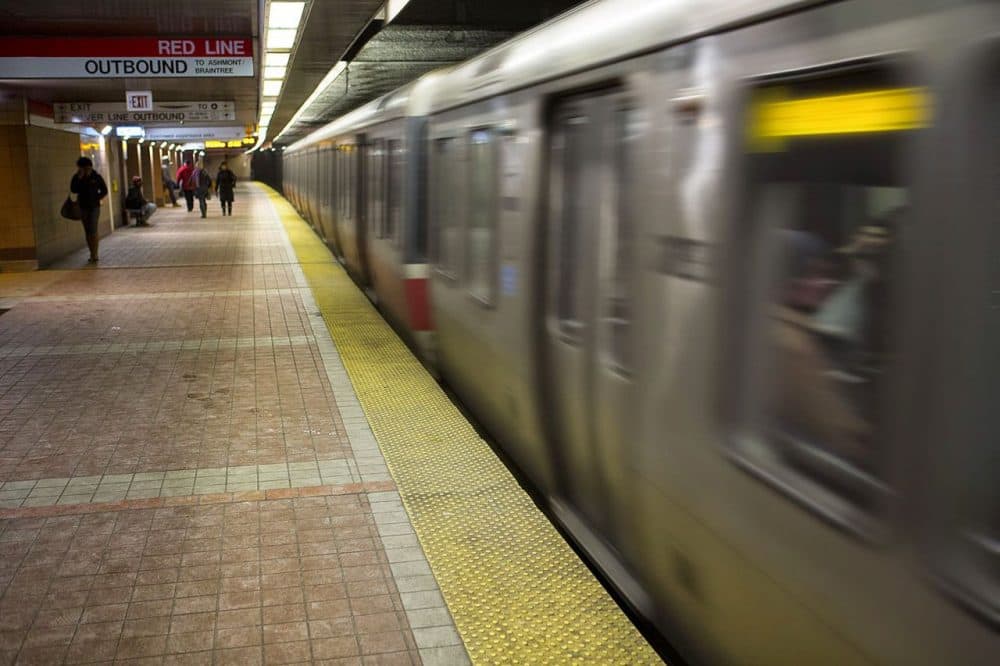Advertisement
New MBTA Chief: There's Never Been More Focus On Fixing The T Than There Is Now
Resume
Brian Shortsleeve has a big job ahead of him. The businessman and former Marine was appointed as the MBTA's new chief administrator last month. Along with the new fiscal control board, he will have to figure out how to deal with the T's $6.7 billion maintenance backlog and $9 billion in debt.
Interview Highlights
On where he thinks he should start in turning the MBTA around:

I think one of the interesting areas to start, when you look at the T, are opportunities on the revenue side. Not necessarily on the fare side, not really talking about fare increases, but talking about non-fare revenue, of which there's a lot. If you look around the country and around the world, there are a lot of transit systems that generate a lot of revenue from things like advertising and being creative around parking and other kind of non-fare revenue sources. There was an article this week on the London metro actually selling data on customer usage patterns, to generate revenue that way.
So I would think that when you look at the T and you think about revenue opportunities, one of the mandates from the governor and from the control board is to make sure that we're maximizing all of the different parts of own-source revenue, which is non-fare revenue. I think that's probably a big opportunity.
On the suggestion from Gov. Baker's MBTA advisory panel that the state take back a portion of the T's debt that is a result of the Big Dig:
I defer to the governor on that. I haven't really gotten that far into exactly what our plan will be on the balance sheet side of the business. The T has a lot of debt, it's over $400 million a year of debt service, which are big numbers, so I'd probably defer to the governor on that. But I think as we look at it, those decisions have to be part of our comprehensive plan around what the capital expenditures of the T will be over the next one, five and 20 years. And that's one of the things this team is working very hard to lay out for the control board and the Legislature, what our view is on the capital needs of the T going forward.
On possible public/private service partnerships:
One of the areas that the control board is very focused on is opportunities for public-private partnerships — what are ways we can expand the service areas of the T potentially by working with outside players that may be able to plug into our system and help us provide a service at a more reasonable cost. I think there will be an expansive strategy to try and think about how we can leverage, as much as possible, potential outside parties to help increase the service, and help deliver the service in areas where the T may ... be running buses that are half full, where as in core parts of the city the buses are over loaded. [State House News reported Friday that the T "plans to test the appetite among private bus companies" to provide service on several routes.]
On benchmarks of progress we should look for:
I think a benchmark in six to 12 months will be whether we've been able to lay out for the governor and the Legislature a path for the T to be on a stable footing financially, which means — we understand our costs, we understand where costs are going, we understand what the capital needs are of the T, we've quantified the state of good repair database, which is a really important tool internally that lays out all of the kind of near term needs, and that we can quantify all that so that all the stakeholders understand it and we can lay out a path that enables, over a period of time, the T to be financially stable.
On why people should feel confident that improvements are coming:
I think what you have now is you've got a very intense focus, you've got a great control board in place that's meeting on a weekly basis with five really talented members, that are giving us a day a week of their time. There's a really intense focus now at this point in time on understanding exactly where the T is and diagnosing the problems and driving quickly to make tough decisions around solving the problems. So I would say there's probably never been as intense a focus on fixing the MBTA — from the governor, the Legislature, the control board — as there is now. And I think there really is an opportunity to be bold, be creative, and put together a system both on the operating side and the financial side that will enable this organization to continue to be successful for a long period of time.
Guest
Brian Shortsleeve, chief administrator of the MBTA.
More
State House News Service: MBTA Looking To Privatize Bus Routes
- The MBTA plans to test the appetite among private bus companies to provide service on all of the express bus routes, the lesser-traveled routes in Boston and the suburbs and late night service.
WBUR: Gov. Baker Signs $38.1B Budget, Names MBTA Control Board
- "The new board that will take temporary control of the Boston-area transit system in the wake of last winter’s crippling breakdowns."
- "Transit is always going to be a public good that has to be subsidized by the taxpayers. ... That said, it can't be a blank check. Transit's really important, but so are all the other things state government does."
Radio Boston: New Report Discusses How To Get The MBTA ‘Back On Track’
- "An unsustainable operating budget, organizational instability and chronic capital under-investment were just a few of the structural problems cited in the report."
Radio Boston: A History Of The MBTA’s Woes
- "The T’s woes aren’t caused by an act of God or nature, but rather, perhaps, by a literal act. A state law. An act of politics."
This segment aired on August 21, 2015.